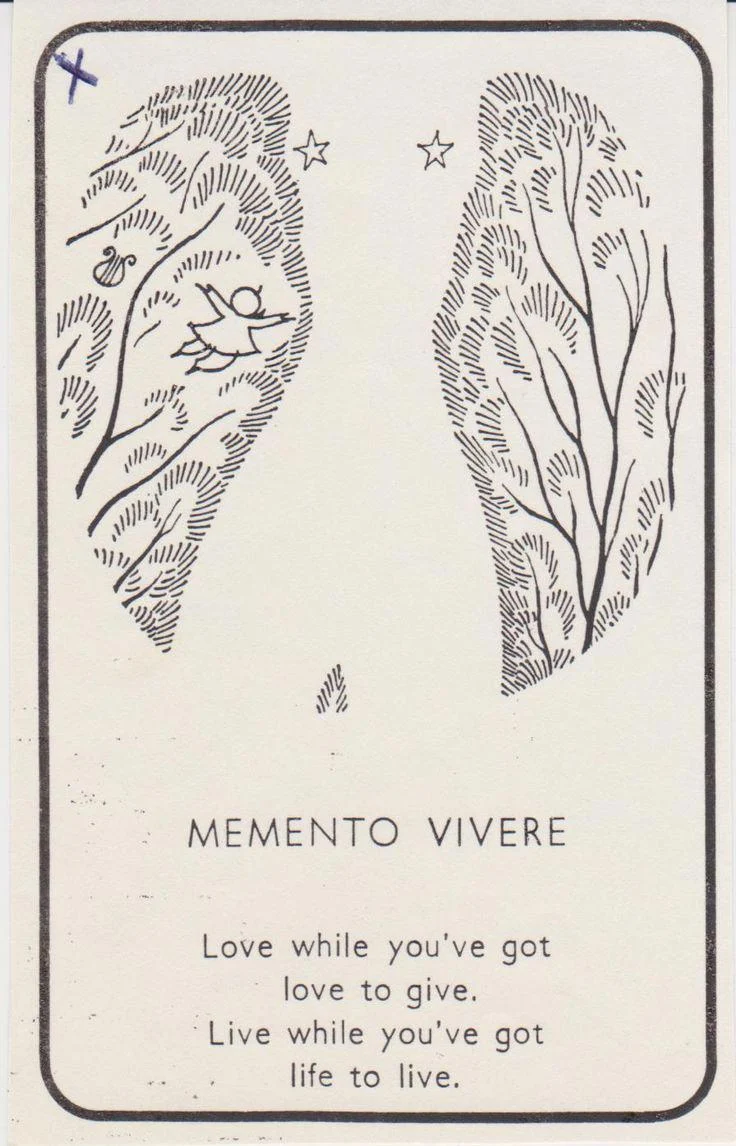Is it possible to find a timeless philosophy that embraces both the fragility and the fullness of life? The answer lies in the Latin phrase "Memento Vivere," a powerful reminder that echoes through time, urging us to savor the present and embrace the beauty of existence.
The words "Memento Vivere" remember to live offer a profound invitation to engage fully with the world around us. It's a call to action, encouraging us to appreciate the simple joys, cherish our relationships, and live with intention and purpose. Originating from Latin, this phrase serves as a counterpoint to "Memento Mori" remember you must die and together, they create a dynamic framework for navigating the human experience.
Before we delve deeper, let us consider some of the important facts about the topic in the form of table to understand it better:
| Aspect | Details |
|---|---|
| Origin | Latin |
| Meaning | Remember to Live |
| Related Phrase | Memento Mori (Remember you must die) |
| Purpose | To encourage appreciation of life and present moments |
| Modern Relevance | Mindfulness, balancing work and life, embracing authentic living |
| Philosophical Implications | Contemplation of mortality, embracing impermanence |
| Practical Applications | Mindfulness, Balance, Relationship, Health, Environmental Consciousness |
| Contrast | It is in contrast with Memento Mori |
| Benefits | Rich and Full Filling Life |
| Language in which its originated | Latin |
| How to Apply | Practical tips to make your life more fulfilling |
| Origin | The origin is Latin |
| Translation | Translated to English as 'Remember to live' |
| Applications | Stress management and quality of life improvement |
| In workplace | Help in reducing stress level |
| Application | Mindfulness, balance in daily life, relationships, health, environment |
| Emphasis | Acknowledging death reminds us to live fully |
| Philosophy | Stoicism |
| Approach | Meditating on life and death |
| Life | No one is eternal |
The genesis of "Memento Vivere" lies in the ancient world, where the recognition of life's brevity served as a powerful motivator for living well. It's a principle that resonates with various philosophical schools of thought, including Stoicism, which emphasized the importance of accepting the present moment and focusing on what we can control.
The concept is not merely a passive reminder, but an active one. It's about choosing to engage with life, to seek out experiences that bring joy and meaning. It's about cultivating gratitude for the simple things a warm cup of coffee, a sunrise, a shared laugh with a loved one. It encourages us to be present, to savor each moment rather than allowing life to pass us by in a blur of routine and obligation.
The contrast between "Memento Mori" and "Memento Vivere" might appear stark, but in reality, they are two sides of the same coin. Acknowledging our mortality "Memento Mori" can serve as a powerful impetus for living fully. When we recognize that our time is finite, we are more likely to prioritize what truly matters and to let go of the trivial. Embracing "Memento Vivere" becomes easier when we understand the temporary nature of our existence.
In today's fast-paced world, the call to "remember to live" is more relevant than ever. We are bombarded with distractions, constantly connected and yet often feeling disconnected. This constant stimulation can lead to stress, anxiety, and a sense of being overwhelmed. "Memento Vivere" offers a path out of this cycle, reminding us to slow down, to breathe, and to appreciate the beauty that surrounds us.
There are many ways to put "Memento Vivere" into practice. Practicing mindfulness, for example, can help us to be more present in each moment. This could be as simple as taking a few deep breaths and focusing on the sensations of the body or paying close attention to the taste and texture of our food. Cultivating gratitude is another powerful tool. Taking time each day to reflect on the things we are thankful for can shift our perspective and make us more appreciative of our lives.
Building and nurturing relationships is another key aspect of "Memento Vivere." Spending quality time with loved ones, expressing our feelings, and supporting each other creates strong bonds that enrich our lives. Prioritizing our health, both physical and mental, is also crucial. This includes eating a balanced diet, exercising regularly, getting enough sleep, and seeking help when needed.
The concept of "Memento Vivere" has found expression in various forms throughout history. It is not just an idea confined to philosophers and intellectuals; it is a philosophy that can be woven into the fabric of everyday life. Artistic expression is also often linked to "Memento Vivere," serving as a reminder of the transient nature of life. The concept appears in literature, music, and visual arts. The artistic rendering often allows individuals to contemplate their lives, their relationship to the world, and their place in the universe.
Modern applications of "Memento Vivere" extend to various aspects of life. People are encouraged to find more meaning in their lives instead of doing routine work. In the workplace, "Memento Vivere" can help reduce stress and improve the quality of life. It encourages people to use their time in a more meaningful way. It can be applied to mindfulness, balance in daily life, relationships, health, and environmental consciousness.
The application of "Memento Vivere" extends beyond personal well-being; it also carries implications for our approach to the world around us. Environmental consciousness, for example, becomes more significant when we consider the finite resources of our planet. Taking care of our environment becomes an act of reverence for the gift of life that we have been given.
The practice of "Memento Vivere" encourages us to evaluate our values and align our actions with them. If we value relationships, we will prioritize spending time with our loved ones. If we value health, we will make choices that support our physical and mental well-being. If we value creativity, we will make time for artistic expression. It encourages the exploration of our values and the ways we use to make our lives better.
"Memento Vivere" also teaches us to embrace imperfection. The world is not perfect, and neither are we. Learning to accept the inevitable ups and downs of life, along with failures and disappointments, allows us to navigate the human experience with greater resilience and grace. It teaches us that it is ok to make mistakes, that resilience is a key part of the process, and that growth comes from confronting adversity.
The phrase "Memento Vivere" is not just a philosophical concept, but a call to action. It is an invitation to live fully, purposefully, and authentically. It reminds us that life is a gift and that we must seize the opportunities it presents to us. It is a timeless reminder that we have the ability to shape our experiences and create a life that is rich, meaningful, and filled with joy.
Consider the words "remember to live" and see how they might resonate within you. You might find a renewed appreciation for the present moment, a commitment to pursuing your passions, and a deeper connection to the world around you. Embrace both "Memento Mori" and "Memento Vivere" for a richer, more fulfilling life.
In conclusion, "Memento Vivere" is a powerful reminder to cherish life's simple pleasures, embrace the present moment, and live authentically. By acknowledging our mortality and embracing life's impermanence, we can navigate the human experience with clarity, purpose, and a profound appreciation for the fleeting beauty of existence. Let us choose to live with intention, to savor each moment, and to remember to live.


